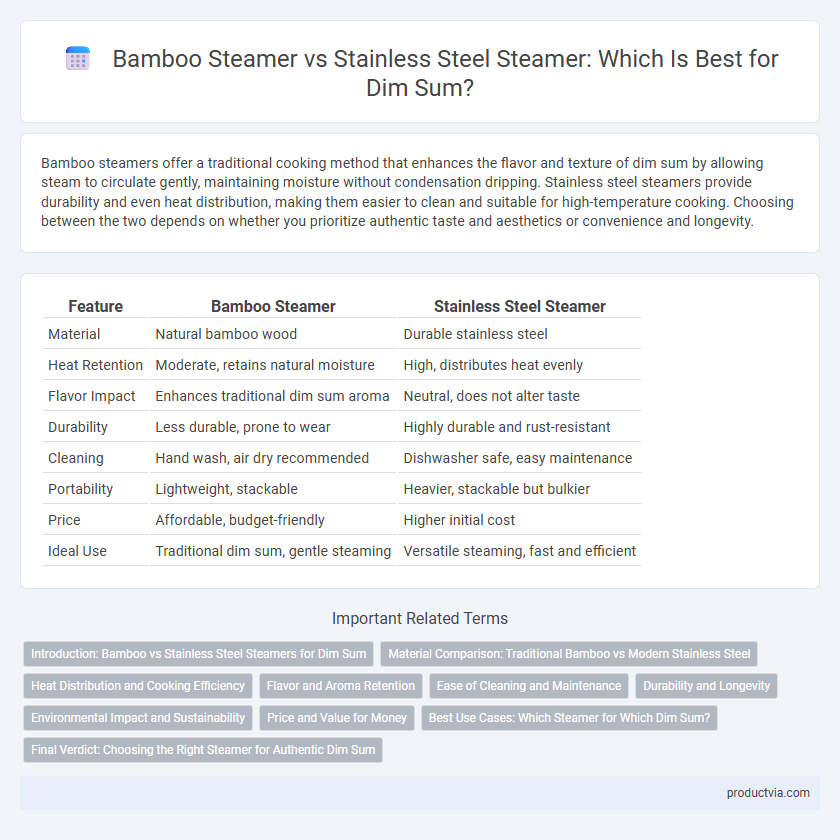Bamboo steamers offer a traditional cooking method that enhances the flavor and texture of dim sum by allowing steam to circulate gently, maintaining moisture without condensation dripping. Stainless steel steamers provide durability and even heat distribution, making them easier to clean and suitable for high-temperature cooking. Choosing between the two depends on whether you prioritize authentic taste and aesthetics or convenience and longevity.
Table of Comparison
| Feature | Bamboo Steamer | Stainless Steel Steamer |
|---|---|---|
| Material | Natural bamboo wood | Durable stainless steel |
| Heat Retention | Moderate, retains natural moisture | High, distributes heat evenly |
| Flavor Impact | Enhances traditional dim sum aroma | Neutral, does not alter taste |
| Durability | Less durable, prone to wear | Highly durable and rust-resistant |
| Cleaning | Hand wash, air dry recommended | Dishwasher safe, easy maintenance |
| Portability | Lightweight, stackable | Heavier, stackable but bulkier |
| Price | Affordable, budget-friendly | Higher initial cost |
| Ideal Use | Traditional dim sum, gentle steaming | Versatile steaming, fast and efficient |
Introduction: Bamboo vs Stainless Steel Steamers for Dim Sum
Bamboo steamers offer natural moisture absorption and gentle steam circulation, preserving the delicate texture and flavor of dim sum. Stainless steel steamers provide durability, faster heating, and easy cleaning but may cause condensation to drip onto food, affecting taste. Choosing between bamboo and stainless steel steamers depends on prioritizing traditional authenticity versus convenience and longevity.
Material Comparison: Traditional Bamboo vs Modern Stainless Steel
Bamboo steamers, made from natural, eco-friendly materials, excel at absorbing excess moisture, preventing sogginess in delicate dim sum like dumplings and buns. Stainless steel steamers offer superior durability, heat conduction, and ease of cleaning, making them ideal for frequent use and dishwasher compatibility. While bamboo steamers impart a subtle woody aroma that enhances traditional flavors, stainless steel provides a neutral cooking environment that preserves the original taste profile.
Heat Distribution and Cooking Efficiency
Bamboo steamers distribute heat gently and evenly, preserving the delicate textures and flavors of dim sum while allowing moisture to circulate naturally. Stainless steel steamers heat up quickly and maintain consistent temperatures, ensuring faster cooking times and higher energy efficiency. Choosing between the two depends on whether traditional flavor retention or rapid, uniform cooking is the priority.
Flavor and Aroma Retention
A bamboo steamer excels in preserving the authentic flavor and aroma of dim sum by allowing gentle steam circulation and minimal condensation, which maintains moisture balance. Stainless steel steamers, while durable and easy to clean, can sometimes create a harsher steaming environment that may dilute delicate flavors and aromas. For traditional dim sum, bamboo steamers are preferred for their natural ability to enhance the sensory experience of aroma and taste.
Ease of Cleaning and Maintenance
Bamboo steamers require more careful cleaning and thorough drying to prevent mold and maintain durability, making them less convenient compared to stainless steel steamers. Stainless steel steamers offer superior ease of cleaning due to their non-porous surface and dishwasher-safe design, reducing the risk of bacterial buildup. For busy kitchens prioritizing hygiene and low maintenance, stainless steel steamers provide a more practical and long-lasting option for dim sum preparation.
Durability and Longevity
Bamboo steamers offer traditional aesthetics and natural breathability but may wear out faster due to moisture exposure and require careful maintenance to prevent cracking or mold. Stainless steel steamers provide superior durability and longevity, resisting rust, warping, and staining, making them ideal for frequent use and easy cleaning. For long-term investment in dim sum steaming, stainless steel ensures consistent performance and robustness over years of kitchen use.
Environmental Impact and Sustainability
Bamboo steamers are biodegradable and made from renewable resources, making them an eco-friendly choice with minimal environmental footprint. Stainless steel steamers, while durable and recyclable, require energy-intensive manufacturing processes and raw material extraction that increase their environmental impact. Choosing bamboo steamers supports sustainable practices by reducing plastic use and waste in dim sum preparation.
Price and Value for Money
Bamboo steamers generally offer a lower upfront cost and a traditional aesthetic, making them a budget-friendly choice for dim sum preparation. Stainless steel steamers, while often more expensive initially, provide greater durability and heat retention, delivering better long-term value and consistent cooking performance. Evaluating price against longevity and ease of maintenance highlights stainless steel steamers as a more cost-effective investment over time despite the higher initial price.
Best Use Cases: Which Steamer for Which Dim Sum?
Bamboo steamers excel at preserving the delicate texture and subtle flavors of traditional dim sum items like dumplings and buns, making them ideal for steaming delicate dishes evenly while adding a natural aroma. Stainless steel steamers offer durability and faster heat conduction, perfect for cooking larger quantities of dim sum or thicker items such as ribs and meatballs that require consistent high heat. Choosing between bamboo and stainless steel depends on the type and quantity of dim sum, with bamboo favored for gentle steaming of traditional dishes and stainless steel suited for heavier, bulk cooking.
Final Verdict: Choosing the Right Steamer for Authentic Dim Sum
Bamboo steamers retain moisture and impart a subtle woody aroma, enhancing the authentic flavor of dim sum, while stainless steel steamers offer durability and even heat distribution for consistent cooking results. The choice depends on prioritizing traditional taste and presentation versus practicality and ease of maintenance. For genuine dim sum experience, bamboo steamers remain the preferred option, but stainless steel serves well for everyday convenience.
Bamboo steamer vs Stainless steel steamer for dim sum Infographic

 productvia.com
productvia.com